Literature Review: Current Issues in Social Work Child Safeguarding
VerifiedAdded on 2022/12/26
|7
|2017
|35
Literature Review
AI Summary
This literature review critically analyzes current social work practices in safeguarding children, identifying key issues and challenges. The review synthesizes research on topics such as high caseloads, conflicting families, domestic violence, building relationships with fathers, and fabricated or induced illness. It highlights the impact of these factors on child protection, emphasizing the need for adequate training, resources, and effective multi-agency collaboration. The review also addresses the importance of addressing the needs of children directly and the need for interventions to address the various issues. The findings suggest that several systemic issues are impacting the ability of social workers to safeguard children effectively. The paper concludes by underscoring the need for continuous evaluation and improvement in safeguarding practices to ensure the well-being of children. The review references various journal articles and online sources to support its arguments.
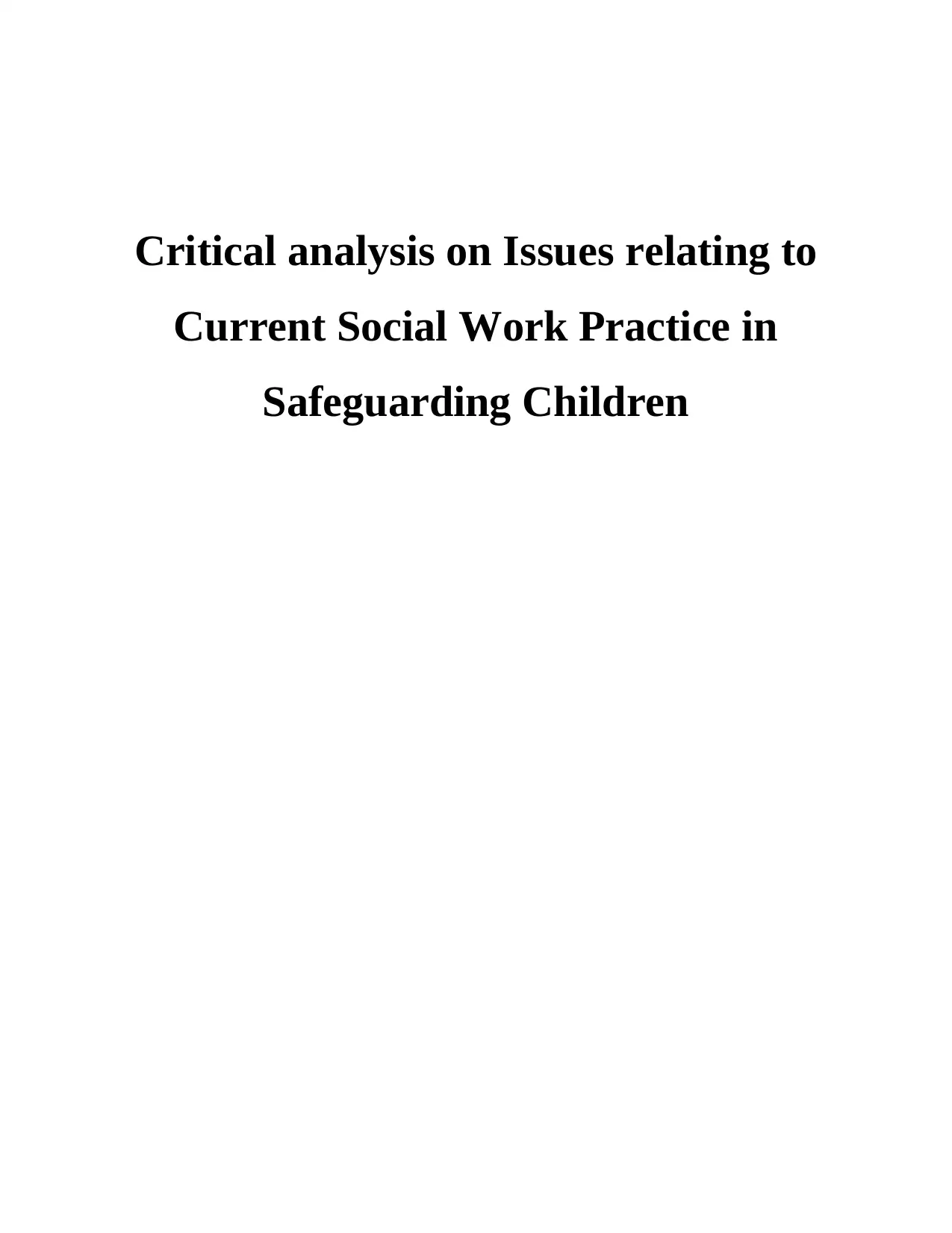
Critical analysis on Issues relating to
Current Social Work Practice in
Safeguarding Children
Current Social Work Practice in
Safeguarding Children
Paraphrase This Document
Need a fresh take? Get an instant paraphrase of this document with our AI Paraphraser

Table of Contents
Results .............................................................................................................................................3
Discussion........................................................................................................................................4
REFERENCES................................................................................................................................7
Results .............................................................................................................................................3
Discussion........................................................................................................................................4
REFERENCES................................................................................................................................7
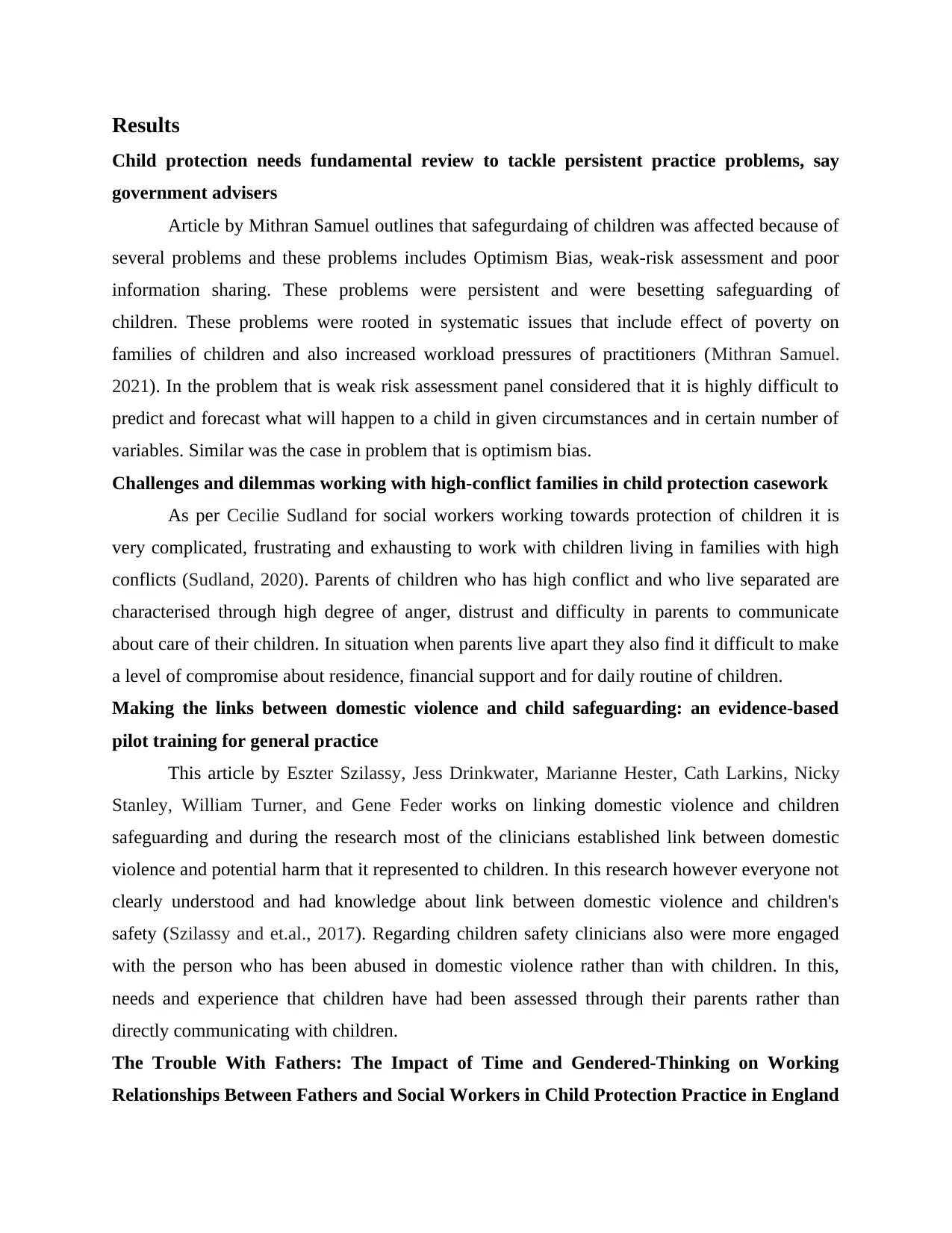
Results
Child protection needs fundamental review to tackle persistent practice problems, say
government advisers
Article by Mithran Samuel outlines that safegurdaing of children was affected because of
several problems and these problems includes Optimism Bias, weak-risk assessment and poor
information sharing. These problems were persistent and were besetting safeguarding of
children. These problems were rooted in systematic issues that include effect of poverty on
families of children and also increased workload pressures of practitioners (Mithran Samuel.
2021). In the problem that is weak risk assessment panel considered that it is highly difficult to
predict and forecast what will happen to a child in given circumstances and in certain number of
variables. Similar was the case in problem that is optimism bias.
Challenges and dilemmas working with high‐conflict families in child protection casework
As per Cecilie Sudland for social workers working towards protection of children it is
very complicated, frustrating and exhausting to work with children living in families with high
conflicts (Sudland, 2020). Parents of children who has high conflict and who live separated are
characterised through high degree of anger, distrust and difficulty in parents to communicate
about care of their children. In situation when parents live apart they also find it difficult to make
a level of compromise about residence, financial support and for daily routine of children.
Making the links between domestic violence and child safeguarding: an evidence‐based
pilot training for general practice
This article by Eszter Szilassy, Jess Drinkwater, Marianne Hester, Cath Larkins, Nicky
Stanley, William Turner, and Gene Feder works on linking domestic violence and children
safeguarding and during the research most of the clinicians established link between domestic
violence and potential harm that it represented to children. In this research however everyone not
clearly understood and had knowledge about link between domestic violence and children's
safety (Szilassy and et.al., 2017). Regarding children safety clinicians also were more engaged
with the person who has been abused in domestic violence rather than with children. In this,
needs and experience that children have had been assessed through their parents rather than
directly communicating with children.
The Trouble With Fathers: The Impact of Time and Gendered-Thinking on Working
Relationships Between Fathers and Social Workers in Child Protection Practice in England
Child protection needs fundamental review to tackle persistent practice problems, say
government advisers
Article by Mithran Samuel outlines that safegurdaing of children was affected because of
several problems and these problems includes Optimism Bias, weak-risk assessment and poor
information sharing. These problems were persistent and were besetting safeguarding of
children. These problems were rooted in systematic issues that include effect of poverty on
families of children and also increased workload pressures of practitioners (Mithran Samuel.
2021). In the problem that is weak risk assessment panel considered that it is highly difficult to
predict and forecast what will happen to a child in given circumstances and in certain number of
variables. Similar was the case in problem that is optimism bias.
Challenges and dilemmas working with high‐conflict families in child protection casework
As per Cecilie Sudland for social workers working towards protection of children it is
very complicated, frustrating and exhausting to work with children living in families with high
conflicts (Sudland, 2020). Parents of children who has high conflict and who live separated are
characterised through high degree of anger, distrust and difficulty in parents to communicate
about care of their children. In situation when parents live apart they also find it difficult to make
a level of compromise about residence, financial support and for daily routine of children.
Making the links between domestic violence and child safeguarding: an evidence‐based
pilot training for general practice
This article by Eszter Szilassy, Jess Drinkwater, Marianne Hester, Cath Larkins, Nicky
Stanley, William Turner, and Gene Feder works on linking domestic violence and children
safeguarding and during the research most of the clinicians established link between domestic
violence and potential harm that it represented to children. In this research however everyone not
clearly understood and had knowledge about link between domestic violence and children's
safety (Szilassy and et.al., 2017). Regarding children safety clinicians also were more engaged
with the person who has been abused in domestic violence rather than with children. In this,
needs and experience that children have had been assessed through their parents rather than
directly communicating with children.
The Trouble With Fathers: The Impact of Time and Gendered-Thinking on Working
Relationships Between Fathers and Social Workers in Child Protection Practice in England
⊘ This is a preview!⊘
Do you want full access?
Subscribe today to unlock all pages.

Trusted by 1+ million students worldwide
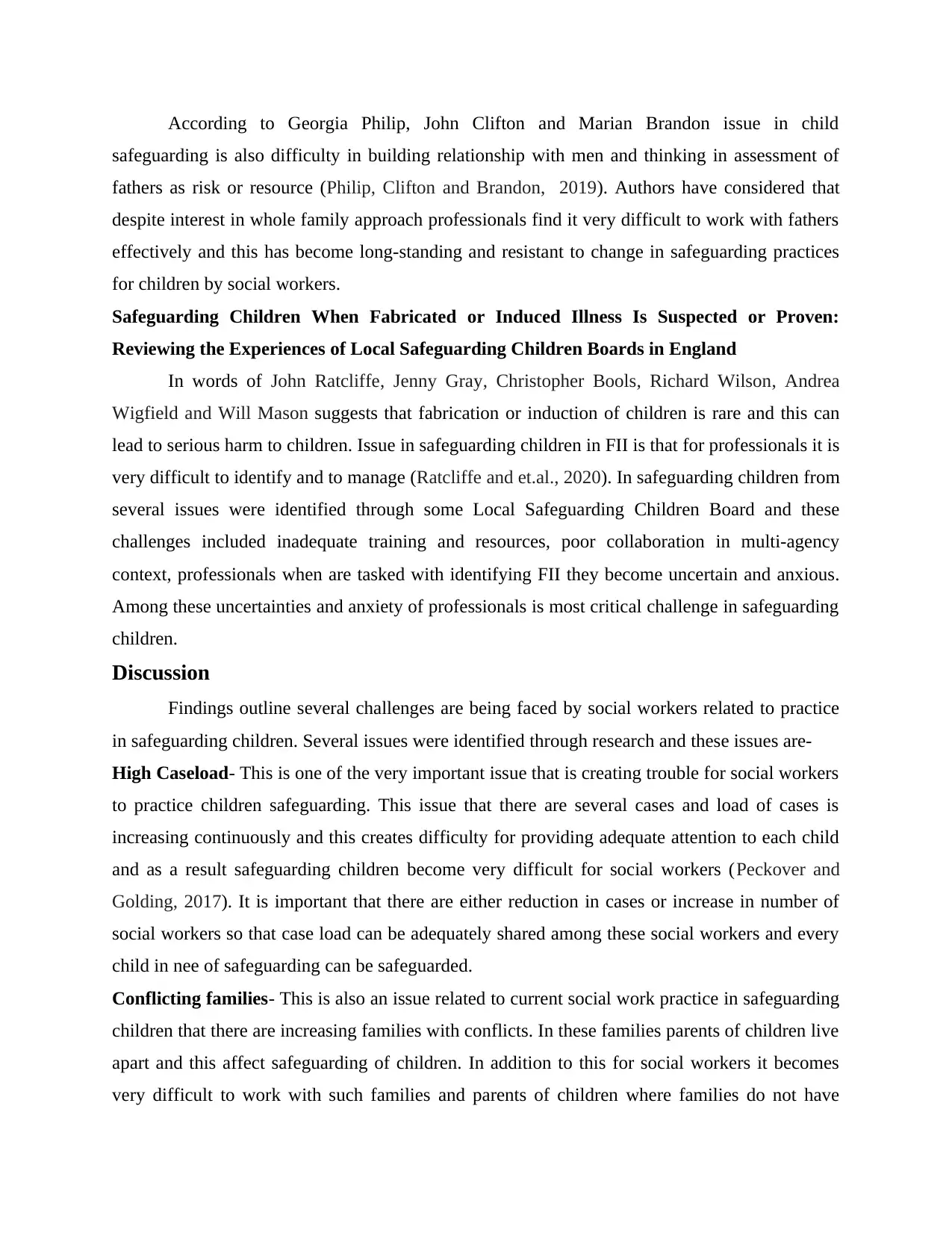
According to Georgia Philip, John Clifton and Marian Brandon issue in child
safeguarding is also difficulty in building relationship with men and thinking in assessment of
fathers as risk or resource (Philip, Clifton and Brandon, 2019). Authors have considered that
despite interest in whole family approach professionals find it very difficult to work with fathers
effectively and this has become long-standing and resistant to change in safeguarding practices
for children by social workers.
Safeguarding Children When Fabricated or Induced Illness Is Suspected or Proven:
Reviewing the Experiences of Local Safeguarding Children Boards in England
In words of John Ratcliffe, Jenny Gray, Christopher Bools, Richard Wilson, Andrea
Wigfield and Will Mason suggests that fabrication or induction of children is rare and this can
lead to serious harm to children. Issue in safeguarding children in FII is that for professionals it is
very difficult to identify and to manage (Ratcliffe and et.al., 2020). In safeguarding children from
several issues were identified through some Local Safeguarding Children Board and these
challenges included inadequate training and resources, poor collaboration in multi-agency
context, professionals when are tasked with identifying FII they become uncertain and anxious.
Among these uncertainties and anxiety of professionals is most critical challenge in safeguarding
children.
Discussion
Findings outline several challenges are being faced by social workers related to practice
in safeguarding children. Several issues were identified through research and these issues are-
High Caseload- This is one of the very important issue that is creating trouble for social workers
to practice children safeguarding. This issue that there are several cases and load of cases is
increasing continuously and this creates difficulty for providing adequate attention to each child
and as a result safeguarding children become very difficult for social workers (Peckover and
Golding, 2017). It is important that there are either reduction in cases or increase in number of
social workers so that case load can be adequately shared among these social workers and every
child in nee of safeguarding can be safeguarded.
Conflicting families- This is also an issue related to current social work practice in safeguarding
children that there are increasing families with conflicts. In these families parents of children live
apart and this affect safeguarding of children. In addition to this for social workers it becomes
very difficult to work with such families and parents of children where families do not have
safeguarding is also difficulty in building relationship with men and thinking in assessment of
fathers as risk or resource (Philip, Clifton and Brandon, 2019). Authors have considered that
despite interest in whole family approach professionals find it very difficult to work with fathers
effectively and this has become long-standing and resistant to change in safeguarding practices
for children by social workers.
Safeguarding Children When Fabricated or Induced Illness Is Suspected or Proven:
Reviewing the Experiences of Local Safeguarding Children Boards in England
In words of John Ratcliffe, Jenny Gray, Christopher Bools, Richard Wilson, Andrea
Wigfield and Will Mason suggests that fabrication or induction of children is rare and this can
lead to serious harm to children. Issue in safeguarding children in FII is that for professionals it is
very difficult to identify and to manage (Ratcliffe and et.al., 2020). In safeguarding children from
several issues were identified through some Local Safeguarding Children Board and these
challenges included inadequate training and resources, poor collaboration in multi-agency
context, professionals when are tasked with identifying FII they become uncertain and anxious.
Among these uncertainties and anxiety of professionals is most critical challenge in safeguarding
children.
Discussion
Findings outline several challenges are being faced by social workers related to practice
in safeguarding children. Several issues were identified through research and these issues are-
High Caseload- This is one of the very important issue that is creating trouble for social workers
to practice children safeguarding. This issue that there are several cases and load of cases is
increasing continuously and this creates difficulty for providing adequate attention to each child
and as a result safeguarding children become very difficult for social workers (Peckover and
Golding, 2017). It is important that there are either reduction in cases or increase in number of
social workers so that case load can be adequately shared among these social workers and every
child in nee of safeguarding can be safeguarded.
Conflicting families- This is also an issue related to current social work practice in safeguarding
children that there are increasing families with conflicts. In these families parents of children live
apart and this affect safeguarding of children. In addition to this for social workers it becomes
very difficult to work with such families and parents of children where families do not have
Paraphrase This Document
Need a fresh take? Get an instant paraphrase of this document with our AI Paraphraser
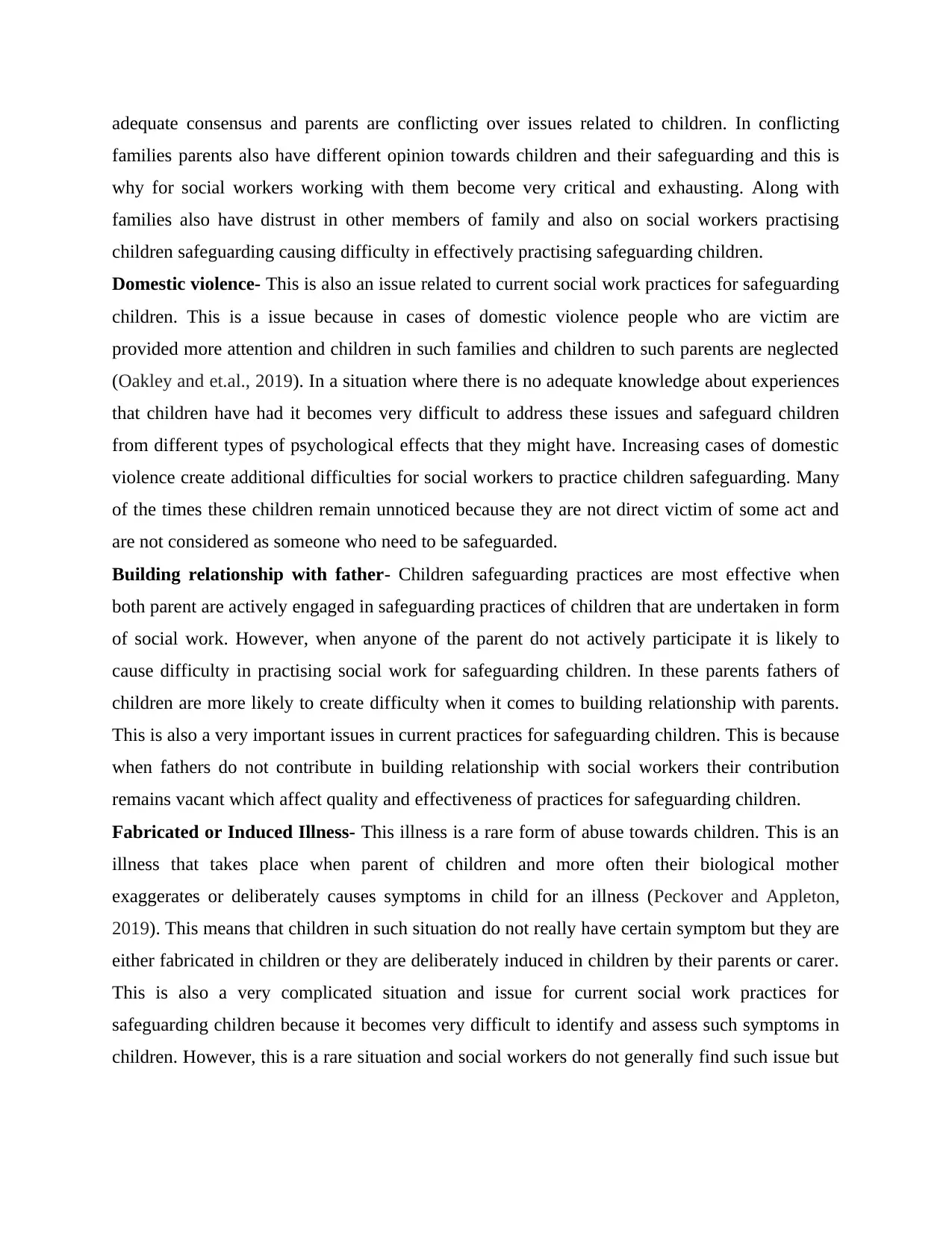
adequate consensus and parents are conflicting over issues related to children. In conflicting
families parents also have different opinion towards children and their safeguarding and this is
why for social workers working with them become very critical and exhausting. Along with
families also have distrust in other members of family and also on social workers practising
children safeguarding causing difficulty in effectively practising safeguarding children.
Domestic violence- This is also an issue related to current social work practices for safeguarding
children. This is a issue because in cases of domestic violence people who are victim are
provided more attention and children in such families and children to such parents are neglected
(Oakley and et.al., 2019). In a situation where there is no adequate knowledge about experiences
that children have had it becomes very difficult to address these issues and safeguard children
from different types of psychological effects that they might have. Increasing cases of domestic
violence create additional difficulties for social workers to practice children safeguarding. Many
of the times these children remain unnoticed because they are not direct victim of some act and
are not considered as someone who need to be safeguarded.
Building relationship with father- Children safeguarding practices are most effective when
both parent are actively engaged in safeguarding practices of children that are undertaken in form
of social work. However, when anyone of the parent do not actively participate it is likely to
cause difficulty in practising social work for safeguarding children. In these parents fathers of
children are more likely to create difficulty when it comes to building relationship with parents.
This is also a very important issues in current practices for safeguarding children. This is because
when fathers do not contribute in building relationship with social workers their contribution
remains vacant which affect quality and effectiveness of practices for safeguarding children.
Fabricated or Induced Illness- This illness is a rare form of abuse towards children. This is an
illness that takes place when parent of children and more often their biological mother
exaggerates or deliberately causes symptoms in child for an illness (Peckover and Appleton,
2019). This means that children in such situation do not really have certain symptom but they are
either fabricated in children or they are deliberately induced in children by their parents or carer.
This is also a very complicated situation and issue for current social work practices for
safeguarding children because it becomes very difficult to identify and assess such symptoms in
children. However, this is a rare situation and social workers do not generally find such issue but
families parents also have different opinion towards children and their safeguarding and this is
why for social workers working with them become very critical and exhausting. Along with
families also have distrust in other members of family and also on social workers practising
children safeguarding causing difficulty in effectively practising safeguarding children.
Domestic violence- This is also an issue related to current social work practices for safeguarding
children. This is a issue because in cases of domestic violence people who are victim are
provided more attention and children in such families and children to such parents are neglected
(Oakley and et.al., 2019). In a situation where there is no adequate knowledge about experiences
that children have had it becomes very difficult to address these issues and safeguard children
from different types of psychological effects that they might have. Increasing cases of domestic
violence create additional difficulties for social workers to practice children safeguarding. Many
of the times these children remain unnoticed because they are not direct victim of some act and
are not considered as someone who need to be safeguarded.
Building relationship with father- Children safeguarding practices are most effective when
both parent are actively engaged in safeguarding practices of children that are undertaken in form
of social work. However, when anyone of the parent do not actively participate it is likely to
cause difficulty in practising social work for safeguarding children. In these parents fathers of
children are more likely to create difficulty when it comes to building relationship with parents.
This is also a very important issues in current practices for safeguarding children. This is because
when fathers do not contribute in building relationship with social workers their contribution
remains vacant which affect quality and effectiveness of practices for safeguarding children.
Fabricated or Induced Illness- This illness is a rare form of abuse towards children. This is an
illness that takes place when parent of children and more often their biological mother
exaggerates or deliberately causes symptoms in child for an illness (Peckover and Appleton,
2019). This means that children in such situation do not really have certain symptom but they are
either fabricated in children or they are deliberately induced in children by their parents or carer.
This is also a very complicated situation and issue for current social work practices for
safeguarding children because it becomes very difficult to identify and assess such symptoms in
children. However, this is a rare situation and social workers do not generally find such issue but
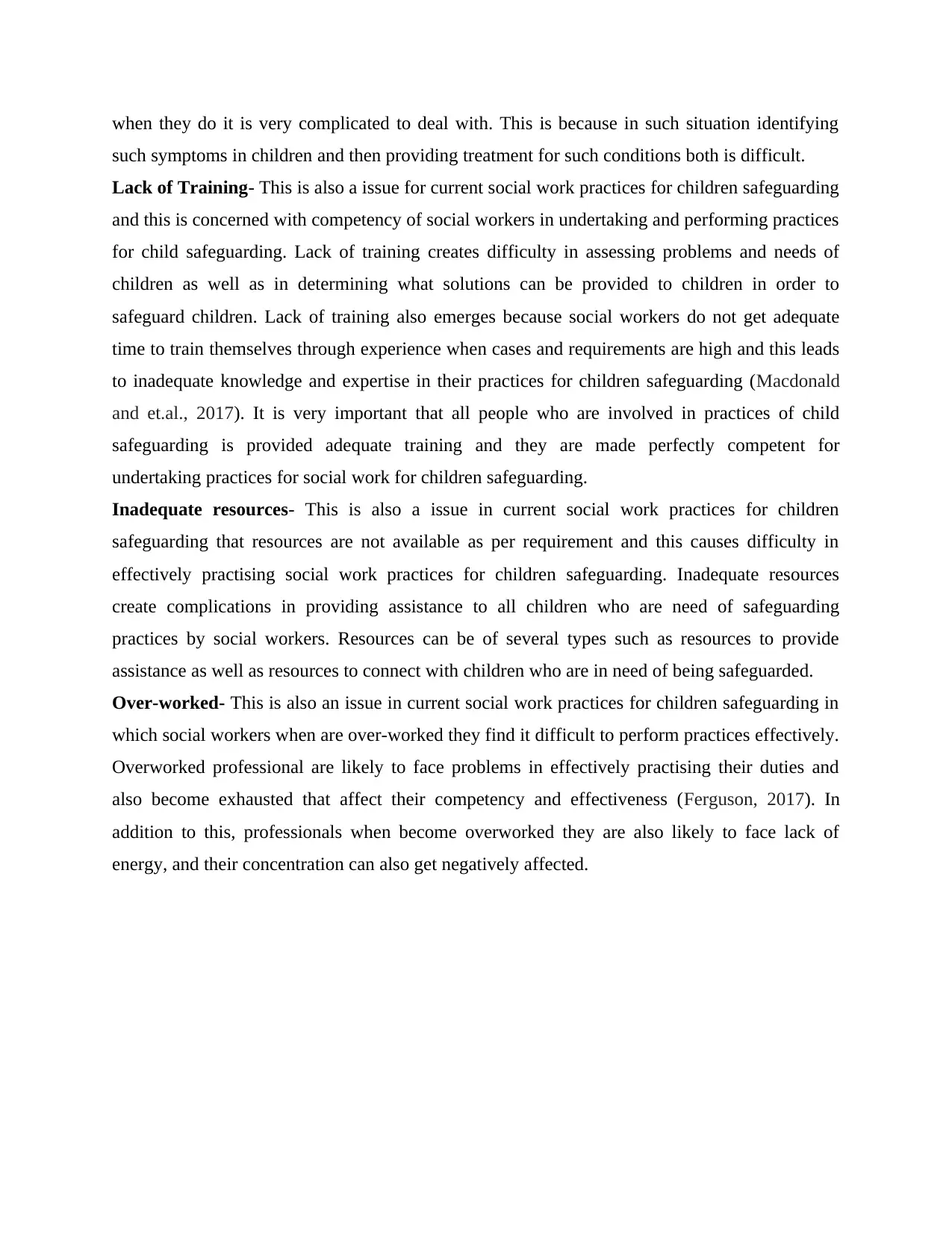
when they do it is very complicated to deal with. This is because in such situation identifying
such symptoms in children and then providing treatment for such conditions both is difficult.
Lack of Training- This is also a issue for current social work practices for children safeguarding
and this is concerned with competency of social workers in undertaking and performing practices
for child safeguarding. Lack of training creates difficulty in assessing problems and needs of
children as well as in determining what solutions can be provided to children in order to
safeguard children. Lack of training also emerges because social workers do not get adequate
time to train themselves through experience when cases and requirements are high and this leads
to inadequate knowledge and expertise in their practices for children safeguarding (Macdonald
and et.al., 2017). It is very important that all people who are involved in practices of child
safeguarding is provided adequate training and they are made perfectly competent for
undertaking practices for social work for children safeguarding.
Inadequate resources- This is also a issue in current social work practices for children
safeguarding that resources are not available as per requirement and this causes difficulty in
effectively practising social work practices for children safeguarding. Inadequate resources
create complications in providing assistance to all children who are need of safeguarding
practices by social workers. Resources can be of several types such as resources to provide
assistance as well as resources to connect with children who are in need of being safeguarded.
Over-worked- This is also an issue in current social work practices for children safeguarding in
which social workers when are over-worked they find it difficult to perform practices effectively.
Overworked professional are likely to face problems in effectively practising their duties and
also become exhausted that affect their competency and effectiveness (Ferguson, 2017). In
addition to this, professionals when become overworked they are also likely to face lack of
energy, and their concentration can also get negatively affected.
such symptoms in children and then providing treatment for such conditions both is difficult.
Lack of Training- This is also a issue for current social work practices for children safeguarding
and this is concerned with competency of social workers in undertaking and performing practices
for child safeguarding. Lack of training creates difficulty in assessing problems and needs of
children as well as in determining what solutions can be provided to children in order to
safeguard children. Lack of training also emerges because social workers do not get adequate
time to train themselves through experience when cases and requirements are high and this leads
to inadequate knowledge and expertise in their practices for children safeguarding (Macdonald
and et.al., 2017). It is very important that all people who are involved in practices of child
safeguarding is provided adequate training and they are made perfectly competent for
undertaking practices for social work for children safeguarding.
Inadequate resources- This is also a issue in current social work practices for children
safeguarding that resources are not available as per requirement and this causes difficulty in
effectively practising social work practices for children safeguarding. Inadequate resources
create complications in providing assistance to all children who are need of safeguarding
practices by social workers. Resources can be of several types such as resources to provide
assistance as well as resources to connect with children who are in need of being safeguarded.
Over-worked- This is also an issue in current social work practices for children safeguarding in
which social workers when are over-worked they find it difficult to perform practices effectively.
Overworked professional are likely to face problems in effectively practising their duties and
also become exhausted that affect their competency and effectiveness (Ferguson, 2017). In
addition to this, professionals when become overworked they are also likely to face lack of
energy, and their concentration can also get negatively affected.
⊘ This is a preview!⊘
Do you want full access?
Subscribe today to unlock all pages.

Trusted by 1+ million students worldwide
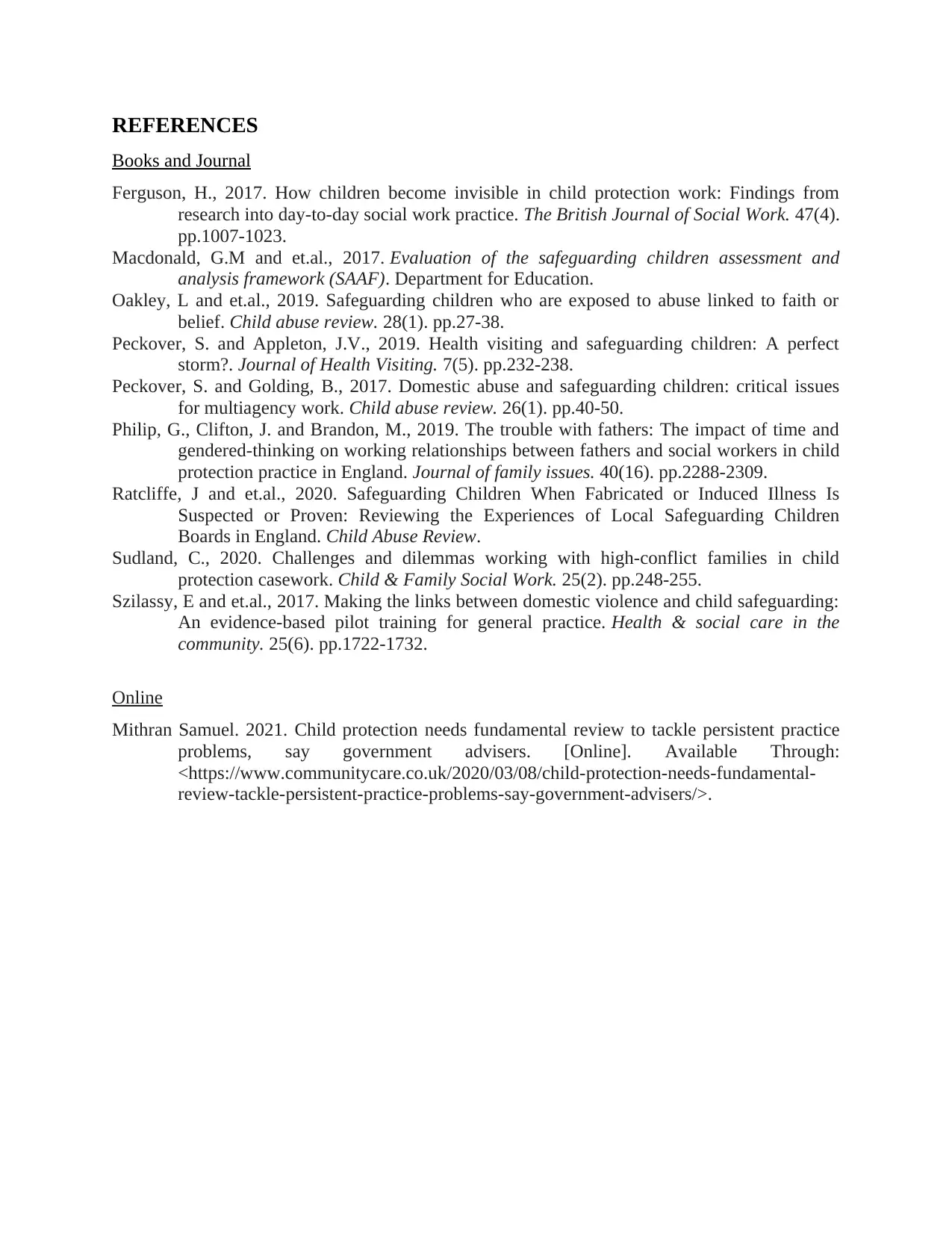
REFERENCES
Books and Journal
Ferguson, H., 2017. How children become invisible in child protection work: Findings from
research into day-to-day social work practice. The British Journal of Social Work. 47(4).
pp.1007-1023.
Macdonald, G.M and et.al., 2017. Evaluation of the safeguarding children assessment and
analysis framework (SAAF). Department for Education.
Oakley, L and et.al., 2019. Safeguarding children who are exposed to abuse linked to faith or
belief. Child abuse review. 28(1). pp.27-38.
Peckover, S. and Appleton, J.V., 2019. Health visiting and safeguarding children: A perfect
storm?. Journal of Health Visiting. 7(5). pp.232-238.
Peckover, S. and Golding, B., 2017. Domestic abuse and safeguarding children: critical issues
for multiagency work. Child abuse review. 26(1). pp.40-50.
Philip, G., Clifton, J. and Brandon, M., 2019. The trouble with fathers: The impact of time and
gendered-thinking on working relationships between fathers and social workers in child
protection practice in England. Journal of family issues. 40(16). pp.2288-2309.
Ratcliffe, J and et.al., 2020. Safeguarding Children When Fabricated or Induced Illness Is
Suspected or Proven: Reviewing the Experiences of Local Safeguarding Children
Boards in England. Child Abuse Review.
Sudland, C., 2020. Challenges and dilemmas working with high‐conflict families in child
protection casework. Child & Family Social Work. 25(2). pp.248-255.
Szilassy, E and et.al., 2017. Making the links between domestic violence and child safeguarding:
An evidence‐based pilot training for general practice. Health & social care in the
community. 25(6). pp.1722-1732.
Online
Mithran Samuel. 2021. Child protection needs fundamental review to tackle persistent practice
problems, say government advisers. [Online]. Available Through:
<https://www.communitycare.co.uk/2020/03/08/child-protection-needs-fundamental-
review-tackle-persistent-practice-problems-say-government-advisers/>.
Books and Journal
Ferguson, H., 2017. How children become invisible in child protection work: Findings from
research into day-to-day social work practice. The British Journal of Social Work. 47(4).
pp.1007-1023.
Macdonald, G.M and et.al., 2017. Evaluation of the safeguarding children assessment and
analysis framework (SAAF). Department for Education.
Oakley, L and et.al., 2019. Safeguarding children who are exposed to abuse linked to faith or
belief. Child abuse review. 28(1). pp.27-38.
Peckover, S. and Appleton, J.V., 2019. Health visiting and safeguarding children: A perfect
storm?. Journal of Health Visiting. 7(5). pp.232-238.
Peckover, S. and Golding, B., 2017. Domestic abuse and safeguarding children: critical issues
for multiagency work. Child abuse review. 26(1). pp.40-50.
Philip, G., Clifton, J. and Brandon, M., 2019. The trouble with fathers: The impact of time and
gendered-thinking on working relationships between fathers and social workers in child
protection practice in England. Journal of family issues. 40(16). pp.2288-2309.
Ratcliffe, J and et.al., 2020. Safeguarding Children When Fabricated or Induced Illness Is
Suspected or Proven: Reviewing the Experiences of Local Safeguarding Children
Boards in England. Child Abuse Review.
Sudland, C., 2020. Challenges and dilemmas working with high‐conflict families in child
protection casework. Child & Family Social Work. 25(2). pp.248-255.
Szilassy, E and et.al., 2017. Making the links between domestic violence and child safeguarding:
An evidence‐based pilot training for general practice. Health & social care in the
community. 25(6). pp.1722-1732.
Online
Mithran Samuel. 2021. Child protection needs fundamental review to tackle persistent practice
problems, say government advisers. [Online]. Available Through:
<https://www.communitycare.co.uk/2020/03/08/child-protection-needs-fundamental-
review-tackle-persistent-practice-problems-say-government-advisers/>.
1 out of 7
Related Documents
Your All-in-One AI-Powered Toolkit for Academic Success.
+13062052269
info@desklib.com
Available 24*7 on WhatsApp / Email
![[object Object]](/_next/static/media/star-bottom.7253800d.svg)
Unlock your academic potential
Copyright © 2020–2026 A2Z Services. All Rights Reserved. Developed and managed by ZUCOL.



